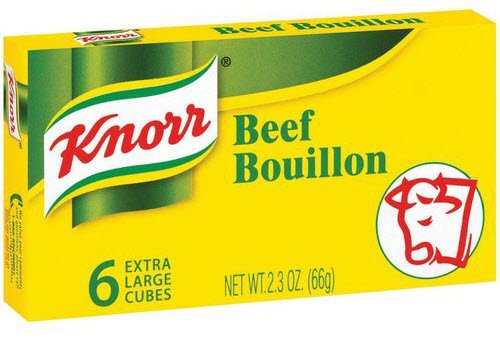We keep broth, stock, and bouillon in our pantry all the time to make some of our favorite cold-weather dishes, like creamy risottos and comforting sauces. Along with being a liquid base, these ingredients give your dish a subtle flavor that doesn’t overpower the seasonings you choose. Since broth, stock, and bouillon are all used in cooking in similar ways, you might wonder if they are really the same thing or if there is a better one to use in a certain recipe.
Beef broth is a foundational ingredient in many soups, stews, gravies, and other dishes. Its rich, meaty flavor adds delicious depth. However, broth requires simmering bones and meat to make, so it’s not always on hand. In a pinch, home cooks may wonder “can you substitute beef bouillon cubes for beef broth?” While not exactly the same, bouillon cubes can work nicely. Read on to learn the differences and how to use bouillon as a handy broth alternative.
What is Beef Bouillon and How Does it Differ from Broth?
Beef bouillon is made from condensed beef stock. To make bouillon, beef bones and meat simmer for hours to extract flavor. The stock then gets dehydrated and formed into small cubes or granules. Bouillon keeps well in the pantry and dissolves easily in hot water.
In contrast beef broth is the liquid obtained directly from simmering beef and bones before condensation. It has a thinner consistency and lighter color compared to bouillon. Broth also contains small pieces of meat, fat, and vegetables used during cooking.
While both deliver rich beef taste a few key differences exist
-
Concentration – Bouillon has a far more concentrated, intense beef flavor. Broth is more diluted.
-
Salt content – Bouillon contains much more added salt and seasonings. Broth’s seasoning comes primarily from the beef itself.
-
Meat content – Broth contains actual beef bits. Bouillon has no solid meat pieces.
-
Shelf life – Bouillon keeps years while broth lasts around a week.
-
Ease of use – Bouillon dissolves easily while broth must be homemade or bought pre-made.
So while not a perfect substitute, beef bouillon cubes can work well and offer convenience when broth is unavailable.
How to Substitute Bouillon Cubes for Broth in Recipes
When using beef bouillon cubes in place of broth, keep these tips in mind:
-
Use a 1:1 ratio – Dissolve 1 bouillon cube in 1 cup hot water to equal 1 cup broth.
-
Reduce added salt – Since bouillon contains much more sodium, cut back on any extra salt in the recipe.
-
Simmer dishes thoroughly – Allow soups and stews to simmer so the bouillon flavor incorporates fully.
-
Avoid adding beef – Bouillon already contains concentrated beef flavor so you likely won’t need to add extra meat.
-
Adjust taste at the end – Check the seasoning after cooking and tweak if needed. The dish may need a splash of vinegar, Worcestershire or hot sauce to brighten up the bouillon’s salty flavor.
With a bit of tweaking, beef bouillon cubes can absolutely substitute for broth in most recipes!
Frequently Asked Questions About Substituting Bouillon for Broth
Many home cooks have questions about using bouillon in place of broth. Here are some common FAQs:
How is beef bouillon made?
Beef bouillon begins with stock made by simmering beef bones and meat. The stock gets condensed down and dried with salt and seasonings added.
What’s the difference between broth, stock and bouillon?
Broth is the liquid left from simmering meat and bones. Stock gets additional cooking to extract more gelatin. Bouillon is condensed, seasoned stock.
Can vegetable or chicken bouillon be substituted?
Yes, but the flavor will differ significantly from beef. Use half chicken and half vegetable bouillon to approximate beef more closely.
How long does broth made from bouillon cubes last?
Around 5 days refrigerated which is the same for regular broth. Freeze any extra for longer storage.
What about bouillon granules instead of cubes?
Bouillon granules work the same way. Use 1 teaspoon dissolved in 1 cup hot water in place of 1 broth cup.
Can bouillon be used in recipes needing reduced sodium?
No, bouillon is very high in salt content. Opt for low-sodium beef broth in those instances.
What kinds of dishes work well with bouillon?
Bouillon enhances gravies, stews, soups, casseroles and pot roasts beautifully. Avoid delicate recipes needing a light broth taste.
Time to Start Cooking!
While homemade beef broth remains the gold standard for flavor,bouillon cubes offer convenience and long shelf life. By adjusting the seasoning and salt, they can work in most recipes calling for broth. Just remember to reduce added salt, taste as you go and enhance the bouillon with acidity or umami as needed.
The next time you find yourself without beef broth, don’t fret. Simple beef bouillon cubes can save the dish and still provide that rich, beefy flavor. Now that you know how to substitute bouillon for broth, it’s time to get cooking!

What is the difference between bouillon and broth?
Let’s start with the simplest of the trio to distinguish: bouillon and broth. What is “bouillon”? It’s the French word for “broth” that has been dried out and turned into a powder or cube.
Bouillon is typically used as a time-saving substitute for a made-from-scratch liquid broth. The flavor of bouillon can be very different depending on what’s in its dehydrated base. This can be vegetables or meats like chicken, beef, or lamb. Bouillon can also be seasoned with a wide variety of spices and herbs.
If you boil one cup of water and add one bouillon cube or a teaspoon of bouillon powder, you get one cup of broth. You can also add bouillon cubes or powder directly to soups, stews, sauces, and curries and melt them in to make them taste better and thicker. Some chefs also like to sprinkle bouillon powder or grated bouillon cubes on food as a seasoning salt to give it a boost of umami-driven flavor.

